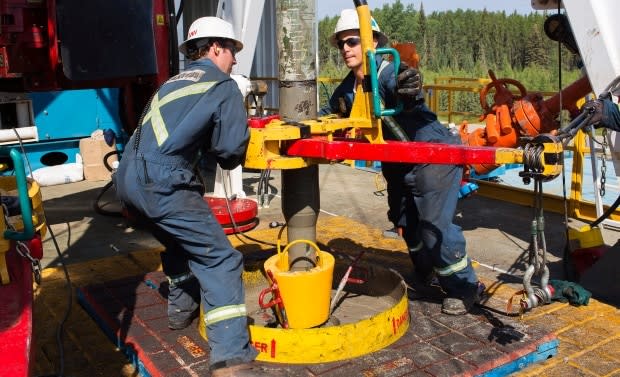Capital spending in Alberta's oilpatch expected to fall by 30% this year
Capital spending on oil and gas extraction in Alberta is expected to fall by roughly $7 billion from last year to $16.6 billion in 2020 — a plunge of about 30 per cent, according to ATB Financial.
In an analysis released Wednesday, the provincial Crown corporation said it would be the lowest spending tally since at least 2006. It said spending by the oil and gas extraction sector will be 58 per cent lower than the 10-year average.
"Oil and gas capital spending was originally expected to be roughly the same as last year — which was already 39 per cent below the 10-year average — but the estimate has been lowered in light of the oil price crash and the global pandemic," said ATB's economics and research team.
Although the numbers weren't a surprise, the report said it was "definitely not good news," noting the money spent on oil and gas extraction has accounted for more than half of the total capital spending in the province over the last decade.

Rob Roach, managing director of research at ATB Economics, said the drop in capital spending not only affects jobs in the oilpatch but the impact of the plunge also ripples out across the province.
"There's less economic activity, less construction, less suppliers," Roach said in an interview.
"Overall, it lowers the amount of investment, the amount of ... other economic activity in the province. So, on both levels, it slows the economy down and reduces employment."
Oil and gas companies reined in production and spending this spring as the COVID-19 pandemic squeezed fuel demand and an international oil price war between Russia and Saudi Arabia helped sink crude prices.
At one point, the North American benchmark price for oil turned negative.
Sector in 'maintenance mode'
Those prices have since recovered to over $40 US a barrel, allowing some companies to ramp up production again, but uncertainty surrounding the pandemic still clouds the industry's outlook.
"Right now, the sector is basically in maintenance mode — it's keeping what they're doing now running," Roach said.
"For that to grow, we do need the global economy and the national [economy] and, especially, the U.S. economy, to recover from the pandemic."
Kevin Birn, a crude oil market analyst at IHS Markit in Calgary, said the $7-billion decline in spending on oil and gas extraction is an "extraordinarily" large number. But he said it's even bigger when looking at spending reductions made to conventional, unconventional, midstream and petrochemical projects.
An IHS Markit report this spring pegged that number at close to $9 billion.
Birn said production is coming back and he anticipates it will continue recovering over fall and into early next year in Western Canada.
He sees oil prices eventually improving as well, but it will be a "tough slog" with more head winds from the pandemic. As prices eventually creep up, so should spending, he said.
However, Birn said the sector was facing challenges before the pandemic, including completing pipeline projects and increasing social pressure around energy transition.
ATB also said Wednesday that total capital spending in Alberta is expected to be down by $11.4 billion, or nearly 20 per cent. Excluding oil and gas, spending is expected to be down by 12 per cent, or $4.3 billion.
Nationally, capital spending is expected to be nine per cent lower than in 2019.
ATB's analysis is based on Statistics Canada's report this week on spending intentions.

